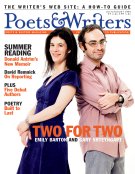With apologies to Ella Fitzgerald, cue the music. Blue Moon.is no longer standing alone.they're leaving Avalon Publishing.they found a love of their own. Blue Moon Books, the publisher of classic erotica, including The Story of O and The Intimate Memoirs of an Edwardian Dandy, was recently acquired by Soft Skull Press (www.softskull.com), the independent publisher in Brooklyn. Blue Moon, which releases forty titles annually, was founded in 1987 by Barney Rosset, who is best known for introducing Henry Miller and Samuel Beckett to American readers at Grove Press, the small publishing house that he purchased in 1951. In February 1993, Grove and Atlantic Monthly Press merged to form the still-independent Grove/Atlantic, Inc. (www.groveatlantic.com). Avalon Publishing Group had owned Blue Moon Books since 1998, but, as Avalon president Susan Reich recently told Crain's New York Business, "The imprint needs someone to be its advocate. There wasn't anyone here paying attention to it." In other Soft Skull news, founder Richard Nash recently launched a subscription program that is similar to that of Clear Cut Press (www.clearcutpress.com), the independent publisher founded by Matthew Stadler and Richard Jensen in Astoria, Oregon, four years ago. Whereas Clear Cut sells all of their books by subscription-sixty-five dollars entitles a reader to eight books of poetry, fiction, or nonfiction, some already published, others forthcoming-Nash is starting out with category-specific offers. For fifty dollars, subscribers will receive all of the poetry Soft Skull publishes this year, along with a couple of backlist titles thrown in for good measure-eight books all told. For a hundred bucks, subscribers are entitled to every 2006 fiction title as well as Lydia Millet's Oh Pure and Radiant Heart (2005), Derek McCormack's The Haunted Hillbilly (2004), and Matthew Sharpe's The Sleeping Father (2003). Nash, who claims the subscription model is the future of independent publishing, says this is a long-term project. Subs for the press's list of pop culture, graphic novels, and queer-studies books are forthcoming.
The origin of broadsides—poems printed on high-quality paper using a letterpress, sometimes signed by the author, often framed and hung on a wall—can be traced all the way back to the fifteenth century, when the words of popular ballads were printed on single sheets of paper. In the Victorian era, broadside ballads were sold for a penny apiece on the streets of London. Before the Civil War, broadsides that could be easily plastered onto walls were a common form of print communication in the United States. Perhaps the most famous examples are the Dunlap Broadsides—the first two hundred copies of the Declaration of Independence, printed in Philadelphia on the night of July 4, 1776, by John Dunlap. As newspapers proliferated in the mid-nineteenth century, however, broadsides evolved into the artworks now produced by many independent publishers. But Elizabeth Bradfield, a poet and Web designer in Anchorage, Alaska, wants to remind readers of the form’s roots. She, along with two other editors and six artists, recently launched Broadsided Press (www.broadsidedpress.org) as a way to "put words out there for people to snort at, sigh over, argue with, and read.” On the first and fifteenth of every month—less frequently in the summer months—a new broadside is posted on the press’s Web site. Anyone can download it as a free PDF, but if a reader pledges to print out at least two copies of each new broadside and post them in a public place, such as a coffee shop or bus station, his city of residence will be listed as a "vector” for distribution. Currently, the press has vectors in nineteen states, Canada, and England. Broadsided Press has an open submission policy; Bradfield and the other editors choose poems for publication, then the artists bid on each and the winner creates a visual response to it. The press’s archive of broadsides includes poems by Whitman and Yeats as well as contemporary poets Linda Bierds, Geoffrey Brock, Stacie Cassarino, Jonathan Fink, G. C. Waldrep, and others.
Kevin Larimer is the senior editor of Poets & Writers Magazine.








